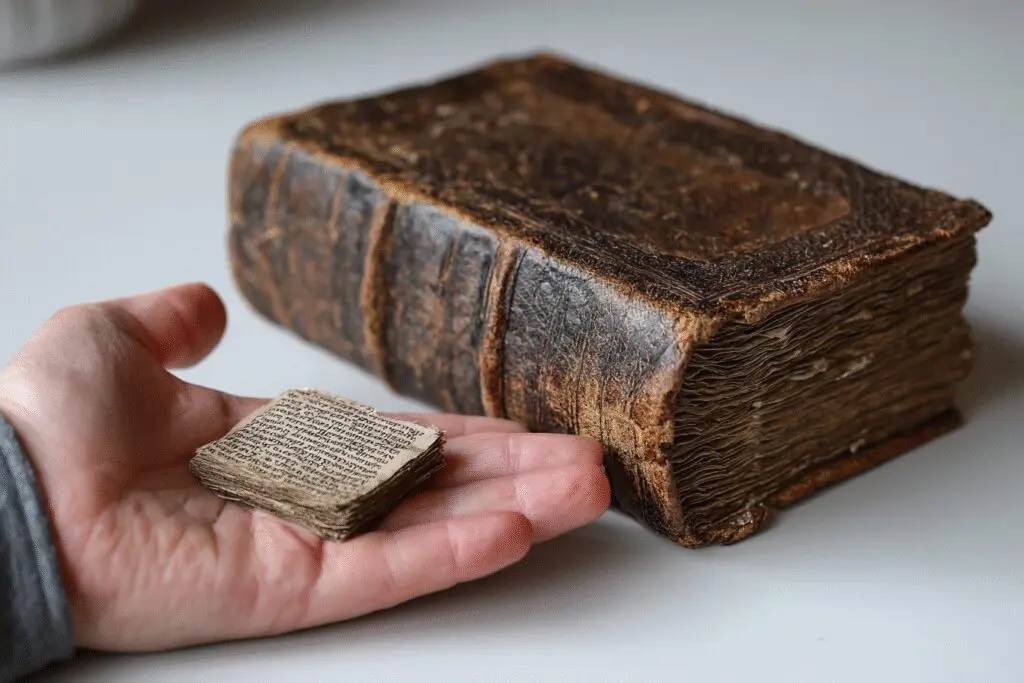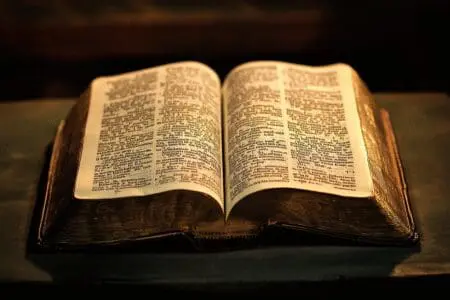Have you ever wondered about the little details of the Bible? I have. One night, during my weekly small group, a simple question popped into my head. We were studying the massive book of Isaiah. And I just thought, “What is the shortest book in the Bible?” It seems like a simple trivia question. But the answer is fascinating. It tells us something amazing about God’s Word.
The answer isn’t as simple as you might think. It depends on how you measure it. But if we go by the original Greek word count, the winner is clear. The shortest book in the entire Bible is the Third Epistle of John, or 3 John.
This little letter is tucked away near the end of the New Testament. It is so easy to miss. But its message is powerful. It reminds us that every single word in the Bible is there for a reason. Size truly does not matter when it comes to spiritual truth.
More in Bible Category
Where Did the Word Bible Come From
What Is the Shortest Verse in the Bible
What Is the Most Used Word in the Bible
Key Takeaways
- The Shortest Book Overall: 3 John is the shortest book in the Bible by word count in its original Greek language.
- The Shortest in the Old Testament: The book of Obadiah holds the title for the shortest book in the Old Testament.
- How We Measure: The “shortest” can be measured by word count, verse count, or chapter count. Word count in the original language is the most accurate method.
- Why It Matters: These short books contain powerful, concentrated messages about truth, hospitality, forgiveness, and humility that are vital for Christians today.
So, How Do We Officially Measure the “Shortest” Book?
This question is more interesting than it seems. I spent a whole afternoon looking into this. I pulled out my study Bible. I looked at different websites and commentaries. It turns out there are a few different ways to measure a book’s length.
Is It a Question of Word Count?
The best way to measure is by word count. Specifically, we should use the original languages. The Old Testament was mostly written in Hebrew. The New Testament was written in Greek. This gives us the most accurate count. Translations can change the number of words.
For example, a Greek word might become two or three English words. This is why scholars look at the source text. In the original Greek, 3 John has only 219 words. That is incredibly short! You can read the entire book in about one minute.
What About Counting the Verses?
Verse count is another way to look at it. This method gives a different answer. The book of 2 John has only 13 verses. 3 John has 14 verses. So, by verse count, 2 John is actually shorter!
This is a fun piece of Bible trivia. It shows why word count is a better measure. The verses in 2 John are just a little bit longer on average. They pack more words into fewer verses. This is why 3 John ultimately takes the crown for the shortest book.
Or Should We Look at the Number of Chapters?
Many people think of length by chapters. This is the easiest way to see the short books. There are five books in the Bible that have only one chapter.
- Obadiah
- Philemon
- 2 John
- 3 John
- Jude
Seeing them listed like this is helpful. It puts their size into perspective. These are the “one-page letters” of the Bible. They are easy to read in a single sitting. But their brevity does not diminish their power. Each one has a unique and vital message from God.
What Is the Little Book of 3 John Actually About?
So, we know 3 John is the shortest. But what does it say? I think this is the most important question. It’s not just trivia. It’s about understanding God’s Word. 3 John is a personal letter. It gives us a beautiful glimpse into the life of the early church.
Who Wrote 3 John and Why Was It Written?
The author is the Apostle John. The same John who wrote the Gospel of John. He also wrote 1 John, 2 John, and Revelation. He was one of Jesus’s closest disciples. By the time he wrote this letter, he was an old man. He was a respected elder in the church.
He wrote this letter to a man named Gaius. Gaius was a dear friend and a beloved member of the church. John praises him for his faithfulness. Gaius was known for his hospitality. He would welcome traveling Christian missionaries into his home. He supported them as they spread the Gospel. John wrote to encourage him to continue this important work.
What Timeless Lessons Can We Learn From This Tiny Letter?
Despite its size, 3 John is full of wisdom. It touches on three powerful themes that we can apply to our own lives.
First, John emphasizes the importance of walking in the truth. He says he has “no greater joy than to hear that my children are walking in the truth.” This is the heart of a spiritual father. He wants to see his fellow believers living out their faith authentically. It is a call for us to be genuine in our walk with Christ.
Second, the letter is a beautiful picture of Christian hospitality. Gaius opened his home to strangers for the sake of the Gospel. This was a critical ministry in the early church. It allowed the message of Jesus to spread. John commends Gaius for this love. He tells him he is doing a faithful work. It challenges me to think about how I use my own home and resources to serve others.
Finally, John gives a strong warning against prideful leadership. He mentions a man named Diotrephes. This man loved to be first. He rejected John’s authority. He was slandering the apostles with wicked words. He also refused to welcome the missionaries. Diotrephes is a picture of what happens when pride takes over in the church. It’s a sobering reminder to serve with humility.
What About the Shortest Book in the Old Testament?
The New Testament has 3 John. But what about the Old Testament? The shortest book in the Old Testament is Obadiah. It has only 21 verses and 440 words in the original Hebrew. Like 3 John, it is a single chapter. But its message is very different. It is a book of prophecy.
What Is the Powerful Story of Obadiah?
Obadiah is a short but intense prophetic message. The prophecy is directed at the nation of Edom. The Edomites were descendants of Esau, Jacob’s brother. They should have been allies to Israel. Instead, they were filled with pride.
When Babylon attacked and destroyed Jerusalem, Edom did nothing to help. In fact, they rejoiced in Israel’s destruction. They even helped capture fleeing Israelites. God saw this pride and betrayal. Through the prophet Obadiah, He pronounced judgment on Edom. He promised that they would be utterly humbled and destroyed.
How Does Obadiah’s Message Still Apply to Us Today?
The lesson of Obadiah is timeless. It is a powerful warning against pride. The Edomites felt secure in their mountain fortresses. They thought no one could touch them. But God says, “Though you soar aloft like the eagle…from there I will bring you down.”
This speaks directly to my heart. It is so easy to put my trust in worldly things. My job, my savings, my own abilities. Obadiah reminds me that God resists the proud. But He gives grace to the humble. It is a call to humble ourselves before our Creator. We must recognize that He is our only true source of security. The book also speaks of ultimate justice and the restoration of God’s people. It’s a message of hope.
Are There Other Tiny Books in the Bible Worth Knowing?
While 3 John and Obadiah hold the official titles, the other one-chapter books are also spiritual treasures. I think of them as powerful espresso shots of truth. They are small but pack a huge punch. We should not overlook them.
The Urgent Message of 2 John
Like its companion letter, 2 John is a personal note from the Apostle John. He wrote it to “the elect lady and her children.” This could mean a specific woman or a local church. The message is simple and urgent. John urges them to love one another. And he warns them to be on guard against false teachers. These deceivers were denying that Jesus Christ had come in the flesh. John tells the church not to welcome them into their homes. This protected the believers from dangerous heresy. It’s a reminder to us to hold fast to the truth of the Gospel.
The Personal Plea of Philemon
Philemon is one of my favorite books in the Bible. It is a deeply personal letter from the Apostle Paul. He wrote it to his friend Philemon. Philemon’s slave, Onesimus, had run away. And somewhere, somehow, Onesimus met Paul and became a Christian.
Now, Paul is sending Onesimus back to Philemon. But he is not sending him back as a slave. He is sending him back “no longer as a slave, but more than a slave, as a beloved brother.” Paul asks Philemon to welcome Onesimus with forgiveness and accept him as an equal in Christ. This short letter is a masterpiece. It’s a brilliant and moving demonstration of the Gospel’s power to break down social barriers and bring about reconciliation.
The Powerful Warning of Jude
The book of Jude is the final one-chapter book. It was written by Jude, the brother of James and Jesus. Like 2 John, it is a strong warning. Jude writes that ungodly people have crept into the church. They are twisting the grace of God into a license for immorality. They deny Jesus Christ. Jude urges the believers to “contend for the faith that was once for all delivered to the saints.” He calls them to build themselves up in their faith. He tells them to pray in the Holy Spirit. And he encourages them to keep themselves in the love of God. It’s a call to be spiritually vigilant. We must guard the precious truth we have been given.
Why Did God Include Such Short Books in the Bible?
I used to wonder about this. Why not just include the big, long books? Why bother with these short, personal letters? But as I’ve grown in my faith, I’ve come to see the beauty in them. God’s wisdom is perfect. He included these books for a reason.
Every Single Word Has a Divine Purpose
The Bible teaches us that all Scripture is God-breathed. It is inspired by God. That means every book, every chapter, every word is there on purpose. There are no wasted words in the Bible. Sometimes the most profound truths come in the smallest packages.
A single drop of rain is tiny. But it is a vital part of a life-giving storm. In the same way, these short books are a vital part of God’s complete revelation to us. They offer unique perspectives. The personal letters, especially, give us an intimate look into the daily life, struggles, and joys of the first Christians. They show us how faith was lived out in the real world. For a deep dive into Bible statistics and composition, Crossway offers some excellent resources, like their article on The Longest and Shortest Books of the Bible.
How Can We Apply These Tiny Texts to Our Lives Today?
These books are not just for historical knowledge. They are for us. They are living and active. They are meant to be applied to our lives right now. They challenge us and encourage us in our walk with Jesus.
Here are a few practical lessons we can take away from them:
- Show Gospel-Centered Hospitality. 3 John calls us to open our homes and our hearts to fellow believers, supporting those who are serving the Lord.
- Discern Truth from Error. 2 John and Jude urge us to be biblically discerning. We must protect ourselves and our churches from false teaching.
- Practice Radical Forgiveness. Philemon demonstrates the power of the Gospel to heal broken relationships. It calls us to forgive others as Christ has forgiven us.
- Humble Ourselves Before God. Obadiah warns us against the deadly sin of pride. It reminds us to find our security and significance in God alone.
How I Learned to Stop Overlooking the Bible’s Smallest Books
I’ll be honest. For years, I overlooked these tiny books. When I did my “read the Bible in a year” plan, I would just fly past them. I’d check the box and move on to the bigger, more “important” books. I saw them as little more than postcards.
That all changed a few years ago. My pastor did a sermon series on Philemon. I had never heard a whole sermon on Philemon before. I was captivated. He unpacked the story with such passion. He showed us the beauty of Paul’s plea. He connected it to the forgiveness we have received in Jesus.
It hit me right in the heart. I realized I had been missing out. I had been treating parts of God’s Word as less important. I went home that afternoon and I didn’t just read Philemon. I studied it. I read it over and over again. I looked at the Greek words. I prayed through it. And God opened my eyes. This tiny, personal letter had a massive message for my life.
From that day on, I’ve had a special love for the small books of the Bible. They are a reminder that God uses small things to accomplish great purposes. He uses ordinary people. And He speaks through short, simple letters just as powerfully as He speaks through long, complex prophecies.
Final Thoughts: Size Is Not a Measure of Importance
So, what is the shortest book in the Bible? The answer is 3 John. But I hope you see that this is more than just a trivia fact. It is an invitation.
It is an invitation to explore the hidden corners of God’s Word. It’s an invitation to see that every single part of the Bible is precious. It is rich with truth and life. The power of a biblical book does not come from its length. It comes from its divine author.
In God’s kingdom, the last are often first. The small is often mighty. A little faith can move mountains. A short prayer can touch the heart of God. And a tiny book can change your life.
I have a challenge for you. After you finish reading this article, go pick up your Bible. Turn to 3 John. It will only take you a minute to read. But ask God to speak to you through it. I promise you will find a message there that is bigger than you can imagine.
Frequently Asked Questions – What Is the Shortest Book in the Bible

Why are short books like 2 John, 3 John, and Obadiah included in the Bible?
These short books are included because they were written by important leaders, address vital issues for the church, and help provide a complete human and theological picture of early biblical history.
What is Obadiah about, and why is it considered the shortest book in the Old Testament?
Obadiah is a prophecy condemning Edom for their pride and betrayal of Israel, containing only one chapter and 21 verses, making it the shortest book of the Old Testament.
What are the main themes of 3 John and 2 John?
3 John emphasizes hospitality and welcoming genuine teachers, while 2 John focuses on warning against accepting false teachers who deny Jesus’ physical incarnation.
Who authored 2 John and 3 John, and what is their significance?
Most experts believe ‘the elder,’ possibly John the Apostle or a different church leader, authored these letters, which are significant as they address early church issues regarding false teachers and community support.




